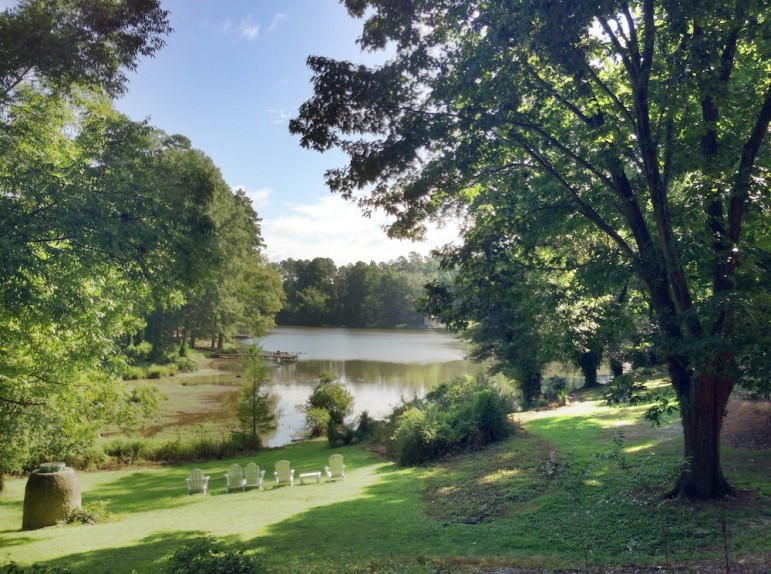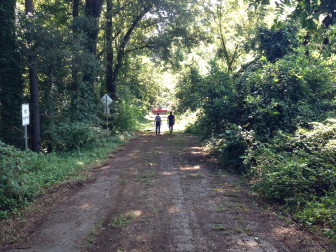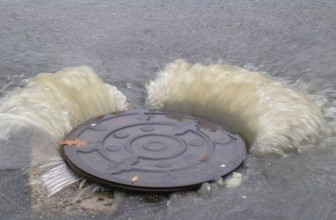City Council on Tuesday discussed a series of projects that would improve water and sewer quality for the city of Raleigh.
The first of these was for the dredging of Longview Lake, located in East Raleigh just off New Bern Avenue. On November 5, 2014, councilors had asked staff to look into the estimated project cost, as well as the other projects that would be impacted if this project was approved.

James Borden / Raleigh Public Record
Longview Lake
The cost estimate was addressed first. Blair Hinkle, the stormwater program manager in Public Works, explained disposal of the material would raise the cost of the project by $900,000 to a total of $1.6 million.
Hinkle noted that through three public meetings, the residents around the lake wanted it dredged.
“We recognize that Longview Lake is important for our water quality,” Hinkle added.
Councilor Weeks asked if staff could spend additional time in the neighborhood.
“We’ve met with them on multiple occasions,” city manager Ruffin Hall said. “We’d be happy to do so again.”

James Borden / Raleigh Public Record
File: October 2013. Reporter Ariella Monti and Gloria Putnam walk down the closed portion of Albemarle Drive at the east end of the Longview Lake Dam.
Councilors had questions about to the bacteria found around the lake’s edges, the participation of the golf course and country club in the process, and the project to repair the dam and whether that project and the dredging would affect one another.
After a brief discussion about how this project would affect others, the item was held at the table until a meeting with the neighborhood and discussion of additional options.
The next job up was the Crabtree Pipeline Project. It involves the construction of a 21,000 linear feet of 54-inch gravity sewer pipe along Crabtree Creek. The portion that will be affected runs from Capital Boulevard to the area just east of Glenwood Avenue.
Eileen Navarrete of Public Utilities gave councilors a presentation on the project and how it would affect the city. The problem focused on two 36-inch parallel interceptors on the north bank and south bank and a lack of wet weather capacity.

Photo by City of Raleigh.
“Unfortunately, we’re having sewage coming out of our manholes,” Navarrete said.
Navarette covered the construction challenges and impacts to citizens, including road closures, greenway closures, and rock excavation. The plan to inform the public was also discussed and included community outreach and meetings with citizens.
“I’m really impressed with the communication strategy,” Councilor Baldwin said. “It’s really refreshing to see us being proactive.”
Other Business
Two items were pulled from the consent agenda.
Item 4.1 concerned a contract amendment that would pay Ramey Kemp and Associates an additional $100,000 for the design of 16 passenger amenity sites throughout the transit service area.
Councilor Baldwin wanted to know why the project was taking so long. David Eatman, transit administrator in Public Works, stated that land acquisition, getting the easements, and right-of-ways were the cause of the perceived slow speed.
“I understand the frustration, but we’re trying to get these shelters in place,” Eatman said.
The item was approved unanimously.
Item 4.2 was also pulled. Councilor Gaylord had a question about the video art projection screen that was to be installed on the wall of the First Union Bank. The question focused on the legality of signs and whether the screen would constitute a sign. Thomas McCormick, the city attorney, said that the screen would not constitute a sign, and the item was approved unanimously.
The remaining consent agenda items were approved without dissent.
In the regular agenda, councilors approved a text change for published notice requirements and an outdoor amplified entertainment permit for the Merrimon-Wynne House.
